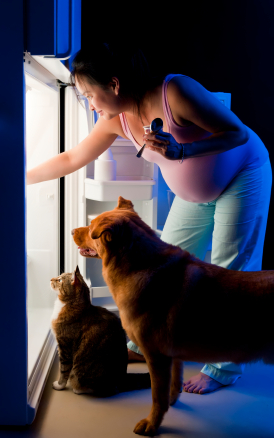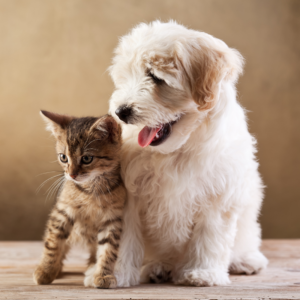Preparing everyone for change: 2 and 4 footed.
Few things change day to day life more drastically then adding an addition to the family. While babies and pets are wonderful to have, reconciling the two sides of the family together can be challenging, overwhelming and occasionally scary.
How do you make pets understand that they are not allowed to do certain things anymore, like climb on the couch or wrestle like before? How do you keep them from destroying the new toys that are not for them? Will they accept the new baby? What if they (the pets) get jealous of the attention that the baby is receiving? These are all questions that every pet owner who is expecting should be thinking about; sooner rather than later. The sooner you start planning for your pet’s reception of the new family member, the smoother it’s likely to be. We have here a few helpful tips from a soon-to-be Mom going through the same thing:
- Start looking early for potential problems. This may mean taking a hard, honest look at your pet’s behaviour, your own behaviour and assessing if this is what you want around your new born. Things like anxiety issues, food aggression, toy aggression, and inappropriate elimination habits can all be major concerns for your new child. Babies are naturally curious and don’t realize that they are scooting their way towards danger by grabbing at Sparky’s favourite toy that he never gives up. Start training early, and don’t be afraid to seek professional help. This is to ensure your child’s safety and that your pet learns the new rules of the house in a constructive way.
- Make sure that you make time for your pets. It sounds simple, but in practice not so much. During pregnancy, it’s all about getting ready for baby, doctors appointments, family gatherings and room preparation. Remember to take time for all your family, including your four-legged family. They need your love and attention as much now as before. And they can help with stress release as well when they do those lovely funny things that make you laugh. Start by finding new activities to do with them if the previous games you played have to change. Find a routine that you will be able to follow when the baby comes so that everyone is happy: Mom, baby and pets. Introduce it early so that when baby comes, everything will start to fall into place.
- If you have cats, make sure that the litterbox is out of baby’s way, but not inaccessible to Kitty. This may involve some creative baby/pet proofing and some time for Kitty to figure out where to go and how to get there. Be patient.
- Allow pets to smell the new room and the new things going into it. Get them used to the new equipment that they will need to interact with. Some examples would be the stroller, rocking cradles, and playpens. Every pet will react differently. I have 4 pets at home, 2 cats and 2 dogs. My cats have simply taken everything as their due and have not been bothered. My Doberman is determined to try and steal every toy he sees since he thinks it’s his. And my American Bulldog is scared of the stroller and can’t understand why it moves. (it’s a bit funny to watch) For our Bulldog, we have kept the stroller out where she can get used to it, sniff it when she wants and see it move when it is in our way. She has slowly been coming around to it and no longer starts back when we move it around.
- Make plans for how you will deal with your pets on the day that baby decides to arrive in advance. Are you going to put them into a boarding facility, or get a house sitter? Get the vaccines up to date before the day so that you are able to handle everything easily. If you are boarding, explain the situation to the facility and leave an emergency contact. If you are getting a house sitter, make sure that they are familiar with your house, your routine and your pets before leaving them for an extended period of time. Have emergency numbers ready and feeding instructions written out ahead of time so that nothing gets forgotten in the rush.
- Relax! Your pets know when you are tense and overwhelmed and they react to it. The calmer you are, the calmer they are and the less likely there will be problems. It will also be easier for you to deal with the issues if you remain calm and relaxed.
Remember to enjoy the process; this is supposed to be a happy time for everyone. You won’t be able to plan for every problem, but planning early will help prevent the worst from occurring.




